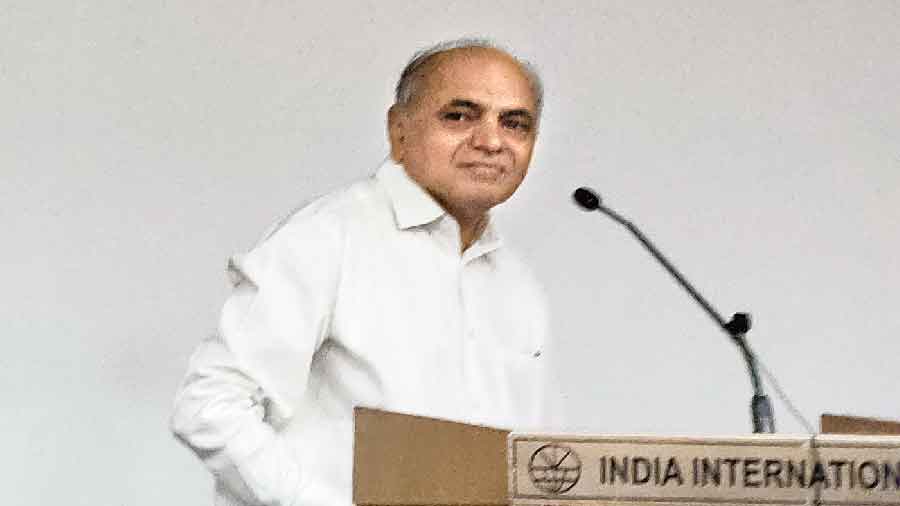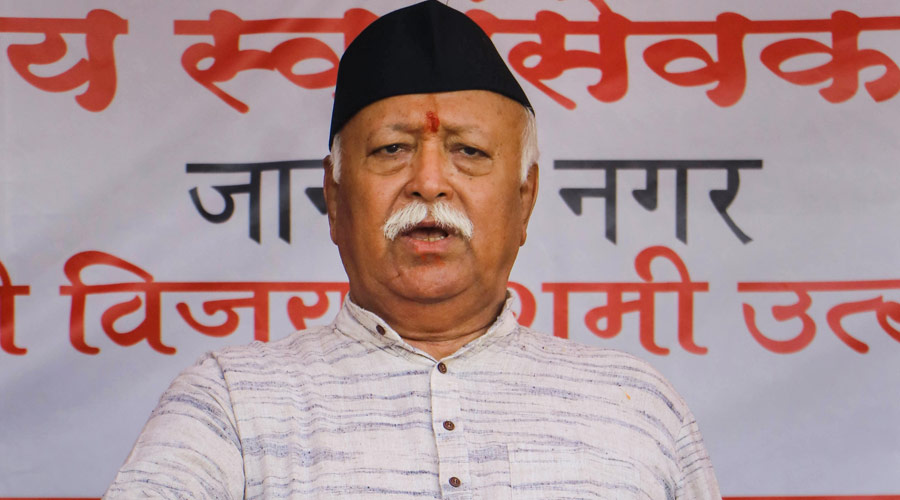Scholars led by linguist Ganesh N. Devy on Sunday announced the publication of a report, “12,000 Years of India: Report on the Civilisation and Histories of India since Holocene”, which they said would portray what India’s history “actually is” in contrast to the RSS version.
The Holocene is the current geological epoch that began around 11,700 years ago, after the last ice age.
Almost 100 scholars have contributed to the report with short essays on genetics, archaeology, anthropology, linguistics, history and the social sciences.
Initiated by the non-profit Bhasha Research and Publication Centre, the report is edited by Devy, archaeologist Ravi Korisettar and journalist and author Tony Joseph. Rajmohan Gandhi, historian and grandson of Mahatma Gandhi, was one of the expert advisers to the project.
Devy told this newspaper that the report, 600-odd-page long, was expected to be published as a book by Aleph next month.
Addressing a gathering at the India International Centre here, Devy suggested the report was a counter to the ruling dispensation’s efforts to present Indian history in a particular manner, and referred to a committee the government has set up to study “12,000 years” of India’s civilisation.
“When the State supports genetic testing for purity, or appoints a committee to rewrite history; when the government appoints people only from the north — no Dalit, no Muslim, Christian or Sikh, no women to this (government) committee — and it is not unlikely that such a report (of the government committee) might end up in NCERT textbooks and the next generation of Indians will grow up thinking about the past very differently, it becomes necessary for a collective of historians, linguists, etc, to come together and present a report on what the history actually is.”
The Centre’s “Committee for holistic study of origin and evolution of Indian culture since 12,000 years before (the) present and its interface with other cultures of the world” was set up in 2016. Last year, culture minister Prahlad Patel told the Lok Sabha that the committee did not exist any more and would be reconstituted.
CPM general secretary Sitaram Yechury, former editor and Congress MP Kumar Ketkar — who has contributed to the report — and socialist activist and Maharashtra MLC Kapil Patil attended the event which also commemorated Buddhist scholar Dharmananda Kosambi's 126th birth anniversary.
Yechury received a draft of the publication from historian Narayani Gupta, a contributor to the report.
Gupta criticised the current bias towards multiple choice questions in examinations.
“I would like you to try and answer some of these questions. Nobody would get through. Things like, on which pillar is this edict of Asoka inscribed?” she said.
“Where are you going to learn the history of India when you are clogging your mind with all this ridiculous information? Isn’t it ironic that a country which has been famed for its rigorous philosophies, its fierce questioning, its exhilarating sense of wonder… has degenerated into this where students are classified as winners or losers?”
Gupta said: “There is no attempt to cultivate individual thinking and, for the purveyors, the only occasion when something is taken out of the NCERT textbook is when there is a charge of some group’s sentiments being hurt.”
She advocated the learning of regional Indian histories.
“Indians continue to see their country in regional terms. Remember, Bankim Chandra Chatterjee wrote Vande Mataram not for India but for Bengal,” Gupta said.
“If students were to study India in terms of regions and not the modern state, the unstated fears that this will set off fissiparous tendencies will be proved wrong.”
Yechury referred to the three prominent pre-Independence political schools — the Congress, the undivided CPI and the RSS — and said the first two had the common goal of a secular democratic republic that contrasted with the ideas of the third.
“The battle of these visions (relates to) the conversion of the secular democratic republic into a rabidly intolerant fascistic Hindutva Rashtra,” Yechury said.
“The offensive coming today is part of a long struggle on what should define India’s character as a country. It is in that battle that this entire question of evaluating history comes into place. That is why this work is of tremendous significance to actually bring out the reality that we are a combination of various histories and civilisations and India is a living crucible of civilisational advance.”
Political scientist Zoya Hasan, who is not a contributor to the report, said: “Historians have pointed out that from 1925 till 1947, the RSS did not participate in any campaign or movement launched by the Congress or any other party or group. Nor did it initiate any movement by itself.
“However, there is an unmistakable attempt at leveraging electoral mandate and power at the Centre for a calculated reinvention of modern Indian history. For this purpose, there is a constant appropriation of modern nationalist leaders and attempts to adopt political icons who do not have any historical connection with their politics or ideology.
“Mahatma Gandhi, Vallabhbhai Patel, B.R. Ambedkar and Subhas Chandra Bose are some of the leaders they have sought to appropriate and present as their own. Perhaps the one thing that distinguished these leaders was their sharp opposition to exclusionary nationalism, which is being passed off as nationalism in the present.”
Political psychologist Ashis Nandy, a non-contributor, however, cautioned against blind rationality.
“I, unfortunately, live at a time when I have learnt to suspect every discipline and every knowledge system. These are post-normal times we are grappling with and it requires us to examine what we have held as gospel truths earlier,” he said.
“Much before the Nazis came to power in the 1920s, German doctors had popularised a slogan to improve the purity of race — any child born with a defect, however minor, must be terminated with the concurrence of their parents…. The old debate of rationality versus irrationality won’t do. The 21st century pathology of rationality has overtaken irrationality.”












